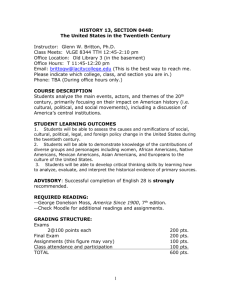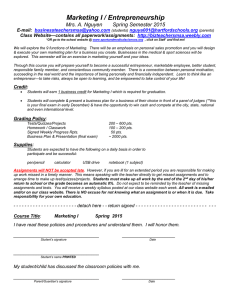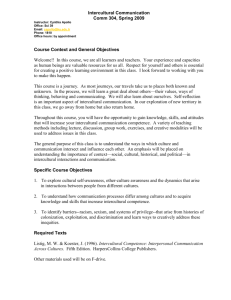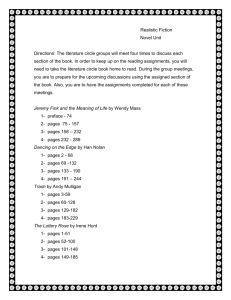COM 372: Intercultural Communication
advertisement
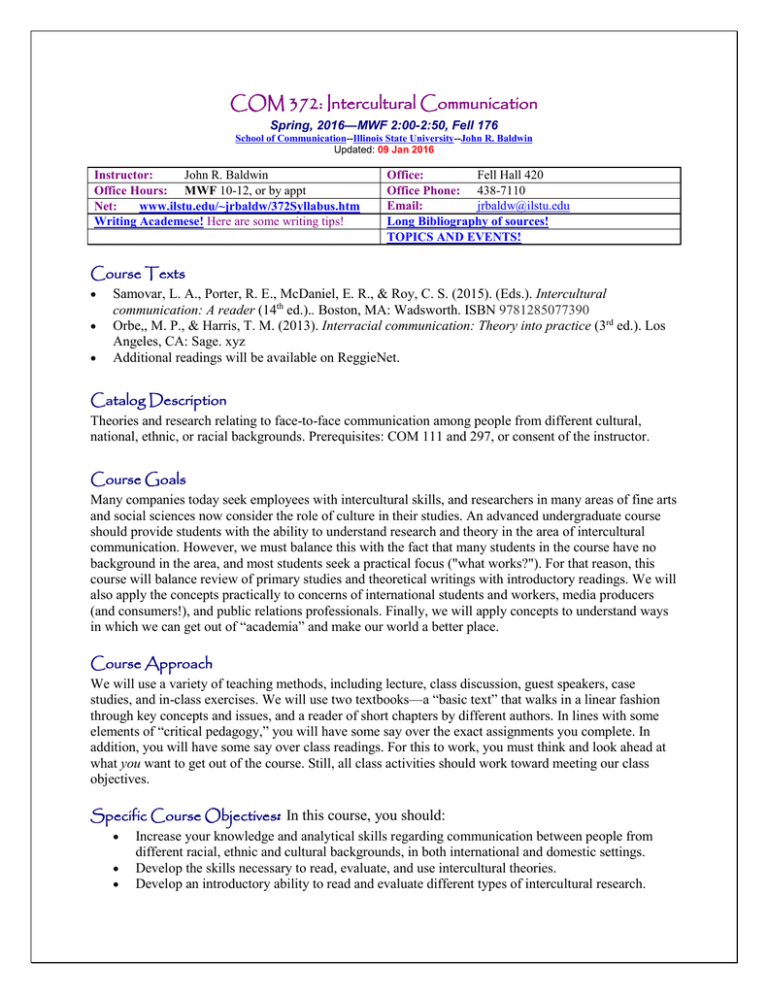
COM 372: Intercultural Communication Spring, 2016—MWF 2:00-2:50, Fell 176 School of Communication--Illinois State University--John R. Baldwin Updated: 09 Jan 2016 Instructor: John R. Baldwin Office Hours: MWF 10-12, or by appt Net: www.ilstu.edu/~jrbaldw/372Syllabus.htm Writing Academese! Here are some writing tips! Office: Fell Hall 420 Office Phone: 438-7110 Email: jrbaldw@ilstu.edu Long Bibliography of sources! TOPICS AND EVENTS! Course Texts Samovar, L. A., Porter, R. E., McDaniel, E. R., & Roy, C. S. (2015). (Eds.). Intercultural communication: A reader (14th ed.).. Boston, MA: Wadsworth. ISBN 9781285077390 Orbe,, M. P., & Harris, T. M. (2013). Interracial communication: Theory into practice (3rd ed.). Los Angeles, CA: Sage. xyz Additional readings will be available on ReggieNet. Catalog Description Theories and research relating to face-to-face communication among people from different cultural, national, ethnic, or racial backgrounds. Prerequisites: COM 111 and 297, or consent of the instructor. Course Goals Many companies today seek employees with intercultural skills, and researchers in many areas of fine arts and social sciences now consider the role of culture in their studies. An advanced undergraduate course should provide students with the ability to understand research and theory in the area of intercultural communication. However, we must balance this with the fact that many students in the course have no background in the area, and most students seek a practical focus ("what works?"). For that reason, this course will balance review of primary studies and theoretical writings with introductory readings. We will also apply the concepts practically to concerns of international students and workers, media producers (and consumers!), and public relations professionals. Finally, we will apply concepts to understand ways in which we can get out of “academia” and make our world a better place. Course Approach We will use a variety of teaching methods, including lecture, class discussion, guest speakers, case studies, and in-class exercises. We will use two textbooks—a “basic text” that walks in a linear fashion through key concepts and issues, and a reader of short chapters by different authors. In lines with some elements of “critical pedagogy,” you will have some say over the exact assignments you complete. In addition, you will have some say over class readings. For this to work, you must think and look ahead at what you want to get out of the course. Still, all class activities should work toward meeting our class objectives. Specific Course Objectives: In this course, you should: Increase your knowledge and analytical skills regarding communication between people from different racial, ethnic and cultural backgrounds, in both international and domestic settings. Develop the skills necessary to read, evaluate, and use intercultural theories. Develop an introductory ability to read and evaluate different types of intercultural research. Be able to perform basic qualitative and quantitative intercultural research. Be able to make practical applications of theory and research to business, education, marketing, media, or relationships--and to your own life. Realize that intercultural communication studies can be challenging but fun! Course Grade You will earn your grade through the following assignments: Assignment Research Project: Topic Method proposal (1-page summary) Review of literature Methods section Results Papers/ Final Presentation Abstract Exams: Exam 1: Exam 2: Exam 3: Final:[some elements comprehensive] Participation/tickets-to-enter TOTAL Due Date Possible 01/22/16 02/8/16 03/04/16 03/28/16 04/18/16 04/2716 ----60 pts 40 pts 35 pts 40 pts 25 pts 01/29/16 50 Earned 200 02/05/16 02/29/16 04/01/16 TBA __/60 __/40 __/35 __/40 __/25 __/50 200 ___/50 ___/50 ___/50 ___/50 __/50 500 Course Grade: 90% = A; 80% = B; 70% = C; 60% = D; under 60% = F Graduate Students will have higher expectations on final paper and will do one theory presentation (oral, with Power Point), worth 100 pts. Their grades will be figured from a total of 800 points. Description of Assignments Research Abstract (50 pts): A 2-page single-spaced summary and critique of a primary research article. This will help you to understand how research authors use existing literature to make an argument, build to research questions or hypotheses, and structure the methods, results, and discussion, to enhance your own final project. Exams (200 pts): All exams will evaluate your mastery of readings, lectures, and class discussions. They will combine multiple choice, short answer, and essay questions. Be able to comprehend, apply, analyze, synthesize, and evaluate concepts. The final will contain key comprehensive terms related to general cultural frameworks. Primary Research Project (200 pts): You will write a paper for potential submission for an appropriate academic research outlet (thus, graduate and undergraduate criteria for length and rigor will vary) but related to civic engagement. Your paper may be quantitative, qualitative, or rhetorical (We will discuss these in class), but must include primary research. I will meet with each group regularly to help with details, instructions. You may work individually or in groups. Participation/Tickets-to-Enter (50 pts): Although our class will be large, we will have in-class discussions and exercises. Also, we will have frequent “tickets-to-enter”—typically, a short question that tests whether you have done the required reading for the day. Extra Credit (up to .15% of total grade): For extra credit, you may attend any out-of-class presentation or engage in an intercultural experience out of class and write a brief report on it. I will bring some ideas to class, but you can also feel free to propose your own ideas. Important Notes: 1. All assignments are due the beginning of class. LATE work may be penalized 10% for each class day late. If lateness is habitual for a given student, stiffer penalties may be imposed. 2. All assignments should be typed and double-spaced, according to American Psychological Association (APA) style manual, 6th ed., unless otherwise noted. Margins should be 1 inch on all sides. No plastic covers or binders, please. 3. Only in extreme circumstances will students be permitted to make up exams or get deadline extensions on projects. Make-up opportunities must be discussed with the instructor in advance of the missed class period or due date. 4. The failure to take any exam or to complete the term project will result in an automatic grade of "F" for the course. If a test or presentation is missed, it is the student's responsibility to make arrangements with the instructor. 5. Always keep careful records of your progress: attendance, returned papers, etc. until you receive (and are in agreement with!) final grade for course. This is especially true for group assignments. It is your responsibility to keep track of your academic progress. I will keep grades updated in ReggieNet. 6. Any form of cheating, including plagiarized papers, will automatically result in a minimum penalty of "F" in the assignment. In some cases, a further sanction may be enforced. 7. The instructor reserves all rights to make changes to this syllabus. However, any changes regarding due dates of assignments or dates of tests will be carried out only by class consensus. In effect, the syllabus is our "contract." If there are updates to schedule, I will post your e-mail account with notification. You are responsible for keeping up with readings and due dates of assignments. 8. Technology Policy: If you use your laptop or hand-held device, you should be working on classrelated materials (website or looking up information pertinent to class). Instructor has right to issue a “hands-off” command and check your screen. If your cell-phone goes off in class, instructor gets to answer it. You may receive texts, but if a situation is urgent that you need to send a text, please excuse yourself from class. 9. Demand and show respect! Some topics we discuss may be emotional for you. It is important to show respect for others and their opinions as well as expect the same for your own. Special Needs: Any student in need of a special accommodation for a documented disability should contact Disability Concerns, 350 Fell Hall 438-5853 (voice), 438-8620 (TDD). COM 372: Intercultural Communication: 2016 Updated 10 Jan 2016 Key: S = Samovar, Porter, McDaniel, & Roy (2014) O = Orbe & Harris RN: ReggieNet Reading TP: Term Project/Assignment Wk 1 Monday 1-11 UNIT 1: INTRO — Course, syllabus; topic areas; time-capsule Wednesday 1-13 Class Exercise: BaFa BaFa 2 1-18 Martin Luther King, Jr. Day—no class 1-20 Ethics, Engagement, and Culture: S Ch 8: Evanoff, Kale, (discussion of abstracts) 3 1-25 Comm, Culture, & ICC: RN: Moon; S: Cleveland 4 2-1 World View: Kluckohn & Strodtbeck; sacred and secular S9: Miike & Yin 2-8 UNIT 3: Identity: Identity (intro) S2: Chen; O: 1-2 TP method proposal due 2-15 Theories of Identity SIT, CTI: S4: Ribeau et al; O6 1-27 Class Exercise: Models of ICC & video analysis; RN: Martin et al. 2-3 Prep for Exam 1; ResNot2: “Writing” Research 5 6 7 8 2-22 Gender, sex, orientation identities. S4: Pearson, Eadie, Braithwaite 2-29 Exam 2: Identity, intolerance 9 3-14 Lang specifics: S chapters BCGS 8: Rhetoric S5: Roy 10 3-21 Nonverbal Code: The key questions & issues: S5: Andersen 3-28 Applications: Readings TBA ResNot6: Media/Rhet analysis TP: Methods Section due 4-4 UNIT 5: APPLICATION CONTEXTS. Relationships – S5: Yum 4-11 Organizations S6: Hinner; O: 9 4-18 Cultural Adjustment TP: Results Sections due 4-25 UNIT 5: CONCLUSIONS: Discussion: Solutions,Community (S8-9 Cleveland, St.Jacques); Course Conclusions 11 12 13 14 15 Friday 1-15 Rationale: Why study ICC? S: McDaniel & Samovar; Korzenny 1-22 UNIT 2: Culture Research Note: Paradigms ResNot1 Surveys & experiments RN: Reynolds; Friday; (Hinner); Cai TP topics due 1-29 Values: S: Collier; RN: Schwartz; Chinese Cult Conn Abstracts Due 2-5 Exam 1: Culture 2-10 Language, Labels, Naming O: 3; RN: TBA ResNot3: Thematic Analysis 2-17 African American, Latina/o, and other identities S2: Pratt et al., Sauceda, 2-24 Psychology: key terms; theories of intolerance: CoCultural Theory (RN: Orbe) 3-2: UNIT 4: MESSAGES Verbal Code: Aspects and functions of language S5: Fong, Cargile 3-16 Language specifics S3: Jain, Skow & Samovar; Bergleson, 3-23 NV specifics: S5: McDaniel, RN: Remland et al. OR Ekman et al [methods & findings] 3-30 Globalization, CMC and Culture S9: Shuter 2-12 Identity development O: 4-5 4-6 IR friendships and romantic relationships. O: 7-8 4-8 IC conflict negotiation: RN: Ting-Toomey & Kurogi S Ting-Toomey; O: 10 4-15 Health S6: Geist-Martin, Rao 4-22 Intercultural Competence S7: Spitzberg 4-29 Present final projects 4-13 Education S6: Skow & Stephan, Gay 4-20 Theories of Adjustment RN: YY Kim Ch. 5; S7: Kim 4-27 Present final projects Term Projects Due 2-19 Whiteness, Postmodernism, Postcolonialism; S Martin; RN McIntosh; Baldwin “Stranger” 2-26 Intolerance: Contact Hypothesis. RN: Dovidio et al.; O: 12 3-4 ResNot4: Ethnog (of Comm) S5: Ellis & Maoz, Begley RN: TBA TP: Review of Lit due 3-18 Theories of Language & Comm: Comm Accom Theory RN: Giles & Noels 3-25 Popular Culture Media & identity. O: 11; RN: TBA ResNot5: Media content analysis 4-1 Exam 3: Messages Final (Exam 4): TBA: Contexts, Applications, and some Comprehensive Stuff Note: We may not cover all readings in a given day. Watch class announcements to focus your reading.
